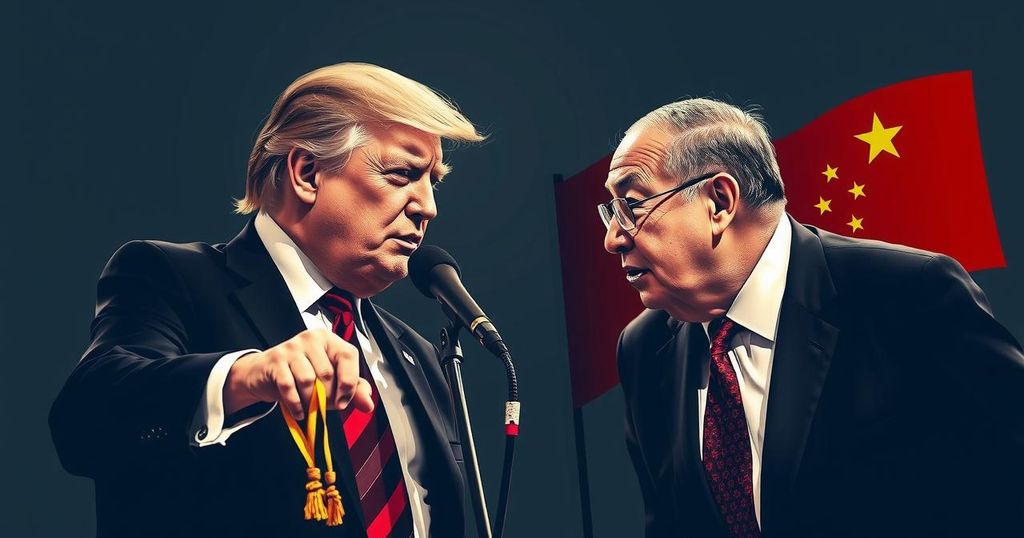Donald Trump has threatened a 100% tariff on BRICS nations if they pursue a rival currency to the U.S. dollar. This comes as BRICS countries aim to reduce their reliance on the dollar in international commerce. Experts consider the practicality of creating an alternative currency challenging, while critics warn that such tariffs may hurt U.S. consumers and weaken faith in the dollar’s global dominance.
President-elect Donald Trump recently threatened to impose a hefty 100% tariff on the BRICS nations, comprising Brazil, Russia, India, China, South Africa, Egypt, Ethiopia, Iran, and the United Arab Emirates. He claimed that these tariffs would be enacted if these countries sought to develop a new currency to rival the U.S. dollar or supported alternatives to it as a medium of international exchange. Trump’s comments were made via Truth Social, whereby he emphasized the importance of maintaining the dollar’s dominance and implicitly warned, “We require a commitment from these Countries that they will… nor back any other Currency to replace the mighty U.S. Dollar or, they will face 100% Tariffs.”
The BRICS alliance was established in 2009 to bolster the economic interests of emerging markets and reduce reliance on the U.S. dollar, which currently holds significant sway in global trade. The dollar’s international stature affords the United States various advantages, including decreased borrowing costs and substantial geopolitical influence.
Aggressive rhetoric from Trump follows similar threats against Canada, Mexico, and China regarding tariffs, which he argues are necessary for curbing illegal immigration and drug trafficking. However, the notion of an alternative BRICS currency being developed by these nations is oversimplified. Experts point out that currency competition faces significant hurdles, given the dollar’s entrenched position as the primary reserve currency globally. Trade specialists, such as Mark Weinstock, indicate that the economic foundations necessary for a viable BRICS currency do not currently exist.
Some nations in the BRICS are downplaying aspirations for a collective currency initiative. Following Trump’s assertions, South Africa reiterated on social media that they have no ongoing plans to develop a BRICS currency. Discussions within BRICS focus instead on increasing trade using their national currencies rather than creating a new one.
Should Trump’s tariff threats come to fruition, the repercussions for U.S. consumers could be severe. Economists agree that such levies would likely lead to higher prices for goods imported from BRICS countries, resulting in inflation and increasing costs for everyday products like electronics and clothing.
Critics of Trump’s approach contend that this strategy may inadvertently undermine confidence in the dollar’s global standing, suggesting that such coercion could catalyze a movement away from the dollar in favor of alternative financial practices. Brad Setser, a senior fellow at the Council on Foreign Relations, asserts that this kind of tactic portrays the dollar as a currency that is advantageous only to the U.S., potentially degrading its perceived strength.
The BRICS nations emerged as a coalition of emerging economies seeking to enhance their economic strength collectively and diminish their dependence on the U.S. dollar. The formation, which included Brazil, Russia, India, China, and South Africa, was aimed at facilitating cooperation among these countries to better represent their interests within the global economic framework. Discussions surrounding an alternative currency have intensified recently due to geopolitical tensions and concerns over the dollar’s ongoing dominance in the global market, with some BRICS members taking steps to reduce their reliance on the dollar by engaging in bilaterally negotiated trade in their national currencies.
In summary, Trump’s threats against BRICS nations highlight a significant aspect of international trade dynamics in which the U.S. seeks to maintain the dollar’s unparalleled status. However, creating a viable currency alternatif is complex and marred by political and economic challenges. Moreover, imposing 100% tariffs could lead to adverse economic effects in the U.S., raising consumer prices. Ultimately, the ongoing narratives around the BRICS and their currency intentions reveal a broader discourse on economic power and independence from U.S. influence.
Original Source: www.cbsnews.com






